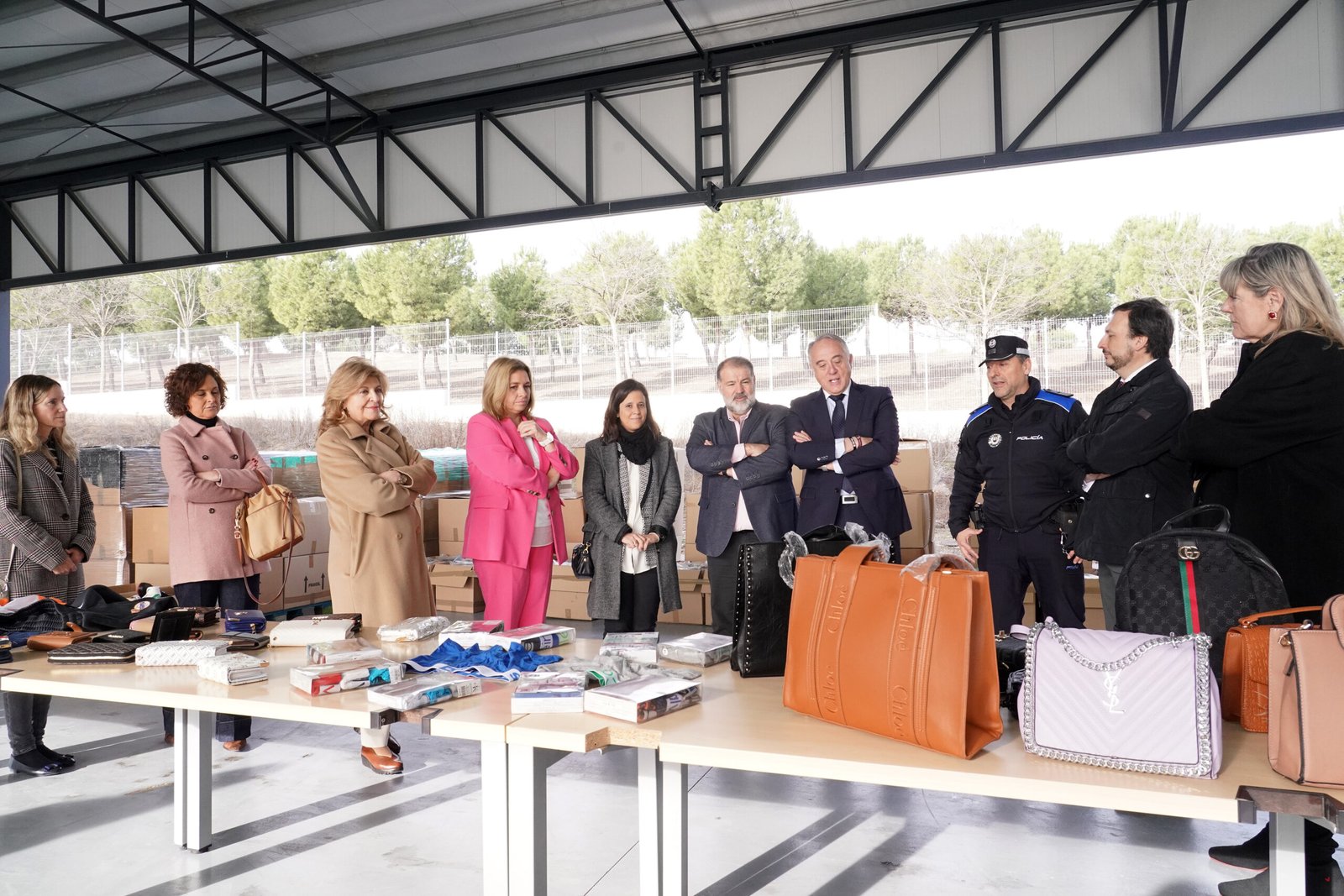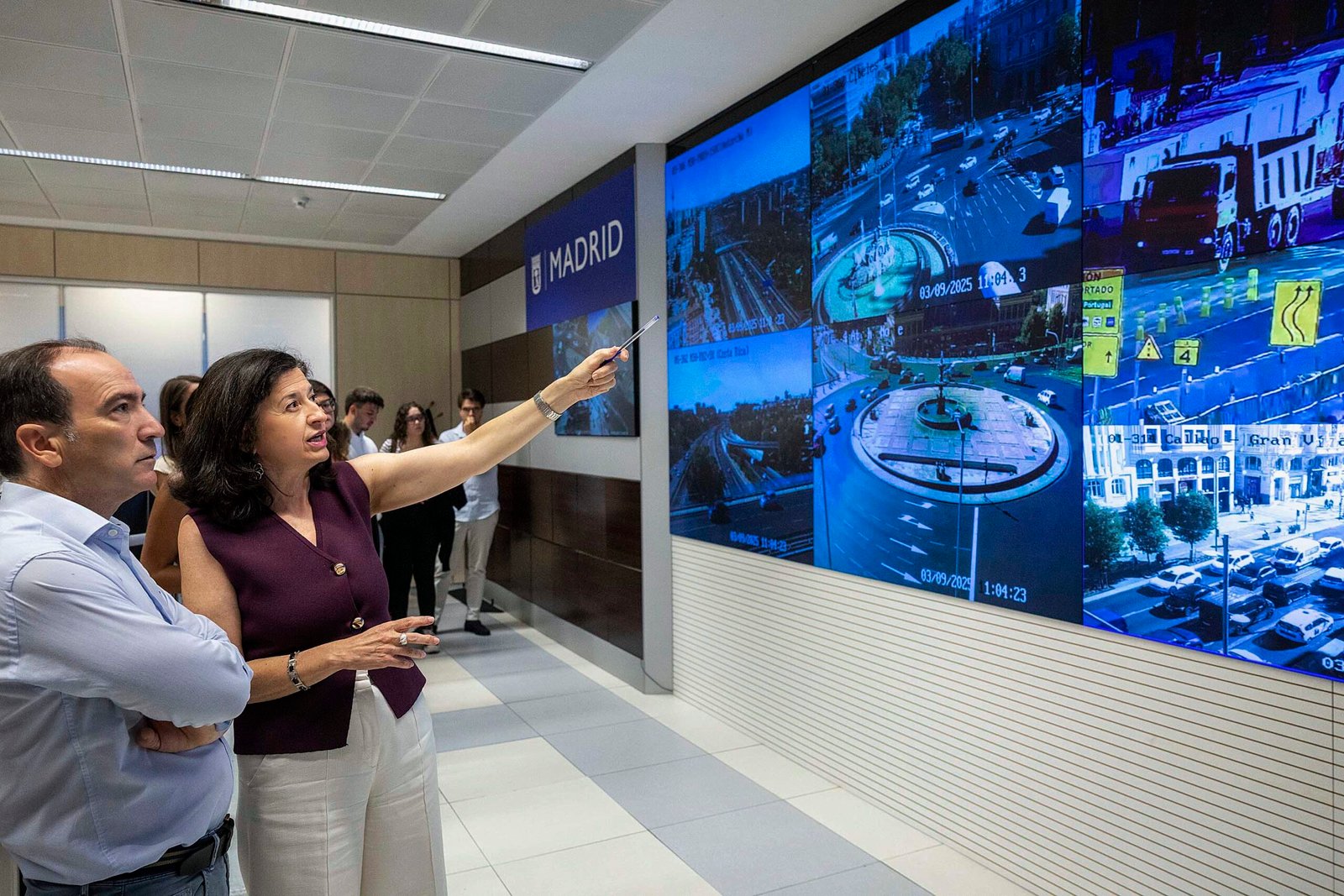Sanz, with Hidalgo, in their visit this morning to the Villa Warehouse, where confiscated counterfeit products are sent to Valdemingómez for destruction
The Madrid City Council destroys thousands of counterfeit products seized by the Municipal Police every year in interventions to protect consumers from intellectual and industrial property crimes, both in public areas (illegal street vending) and in establishments and homes. Today, more than 11,000 of these products were destroyed at the Valdemingómez landfill, after being supervised at the Villa Warehouse by the Deputy Mayor and Delegate for Security and Emergencies, Inma Sanz; the Delegate for Economy, Innovation and Finance, Engracia Hidalgo, and the councilor of Vicálvaro, Ángel Ramos.
Sanz emphasized the «zero tolerance» of the municipal government led by Almeida towards counterfeiting and the sale of illegal products and its «total commitment» to combat this issue in the city both by the Municipal Police and through raising awareness among Madrileños. It has been a municipal priority since the beginning of the previous term, given that, in addition to the harm this activity causes to consumers and brands, behind illegal sales are often mafias that profit by exploiting their sellers.
Interventions in public areas, establishments, and homes
The more than 33,300 counterfeit products seized in 2024 by the Municipal Police were confiscated in operations carried out in public areas, establishments, and homes by both the officers of the 22 district integral police stations and the officers of the Judicial Coordination Police Station.
The former intervened in around 20,800 units of counterfeit products, in addition to thousands more in street vending that do not infringe intellectual and industrial property through the development of their territorial comprehensive security plans, while the Judicial Coordination Police officers seized more than 12,500 units in various operations. The Video Surveillance Room also collaborates by monitoring the most commercial pedestrian areas it has visibility on to detect this illegal activity.
The Municipal Police confiscated these items in more than 8,500 interventions carried out in this area last year, with fewer reports and complaints in public areas compared to an increase in establishments and homes. Of the interventions deployed last year in this area, 194 resulted in individuals being detained or investigated for crimes against intellectual and industrial property, a 44% increase from 2023.
Among all the seized goods, textiles (sportswear, especially football team jerseys, underwear…), accessories (caps, scarves, glasses…), leather goods (bags, wallets, belts…), as well as cosmetic and medicinal products or mobile phones, stand out.
Highlighted interventions
Among the interventions carried out by the Municipal Police throughout 2024, the ‘Blue Operation’ stands out, culminated last June by members of the Judicial Coordination Police Station, in which several large-scale distribution and sale points of counterfeit products, mainly sports clothing like football jerseys and similar products, were deactivated. In this operation, operations from the Centro Sur and Arganzuela police stations were coordinated, four reports were drawn up with three arrests, and a total of 10,683 counterfeit items were seized.
At the beginning of the year, another relevant intervention was conducted by agents from the Centro Sur district police station with actions carried out by the Judicial Coordination Police Station and the seizure of 8,500 counterfeit products (sportswear, especially football jerseys) in a storeroom of a commercial establishment located on Mesón de Paredes Street (Lavapiés), which ended with two arrests.
The ‘Sack Operation’, on the other hand, was another notable intervention carried out by the Judicial Coordination Police Station in a souvenir shop of counterfeit Real Madrid products where 1,500 items were seized and two individuals were investigated.
Counterfeit destruction process
The fraudulent items seized, from illegal street vending and interventions in establishments or homes by the Municipal Police, are stored in police warehouses as well as in the Villa Warehouse, the municipal space under the Area of Economy, Innovation, and Finance located in Vicálvaro that receives, stores, and delivers furniture and objects that, in general terms, are found in public areas contravening municipal regulations and are sent to the City Council by the Municipal Police.
In its 5,000 m2 of usable storage space spread across two warehouses, it houses external deposits such as furniture and belongings from unauthorized occupation of public areas and others resulting from evictions, fires, collapses, and similar causes. In 2024, the Villa Warehouse received 269 external deposits, of which 268 were related to subsidiary executions and one to evictions. Compared to 2023, entries increased by 4.8%. In 2024, 66 external deposits were released, all of them related to subsidiary executions.
The warehouse also has space for items seized in illegal street vending. When it comes to counterfeit products, the Association for the Defense of the Brand (ANDEMA) conducts the counterfeit verification report and once its lack of authenticity is certified, the items are transferred to the Valdemingómez Technological Park, where they are destroyed following sustainability criteria. In 2024, 45 tons of material were taken to the landfill, a 38% decrease from 2023. Of that material, 10,780 are textile items, 8,600 plastics, and 23,310 are various bulky materials.
Non-counterfeit seized items that can be utilized have three possible destinations: their auctioning in a public auction, their use by the City Council, or their donation to an NGO. The City Council currently collaborates with six non-profit entities. In 2024, 1,220 items were donated through this channel, with the Fundación Madrina receiving the most items (1,136).
Regarding municipal availability, most of it consists of textiles offered to the Area of Social Policies, Family, and Equality for SAMUR Social, the San Ildefonso Boarding Residence, or the San Isidro Reception Center, among other entities. These items, generally small in volume and mostly new, are made available to the various municipal units through the internal catalog, which also includes items from the Lost and Found Office that have become municipal property after being deposited for two years without the owner claiming them. Throughout 2024, the Villa Warehouse offered 2,246 items through the internal catalog, of which 1,220 were requested by a municipal unit.
The warehouse also accommodates municipal property goods that are no longer useful for some City Council departments, but, being in good condition, are handed over to other areas for utilization. In 2024, there were 19 entries, totaling 692 pieces of furniture and belongings in this category. The Villa Warehouse also covers specific storage needs of the City Council.
Zero tolerance towards counterfeits and illegal sales
In line with the City Council’s commitment to defending legitimate commerce and authentic products, Madrid was the first Spanish city to join the European Network of Authenticities, and since the last term, the City Council has worked with key entities in the defense of intellectual and industrial property such as ANDEMA (which collaborates with the Municipal Police in training officers to continue fighting industrial property crimes) and the Spanish Patent and Trademark Office.
Under these agreements, efforts are made to raise awareness and social consciousness to curb intentional purchases of counterfeits, including copies of luxury items, a practice where Spain ranks at the forefront of the European Union, second only to Bulgaria. Specifically, up to 20% of Spaniards admit to buying counterfeit products in the last twelve months, while the European average stands at 13%.
To address this issue, new awareness campaigns against counterfeit product sales are planned for June, September, and November this year, as well as the implementation of new consumer workshops for secondary, vocational, and high school students. In 2024, 256 workshops were held with 5,465 student attendees. /



